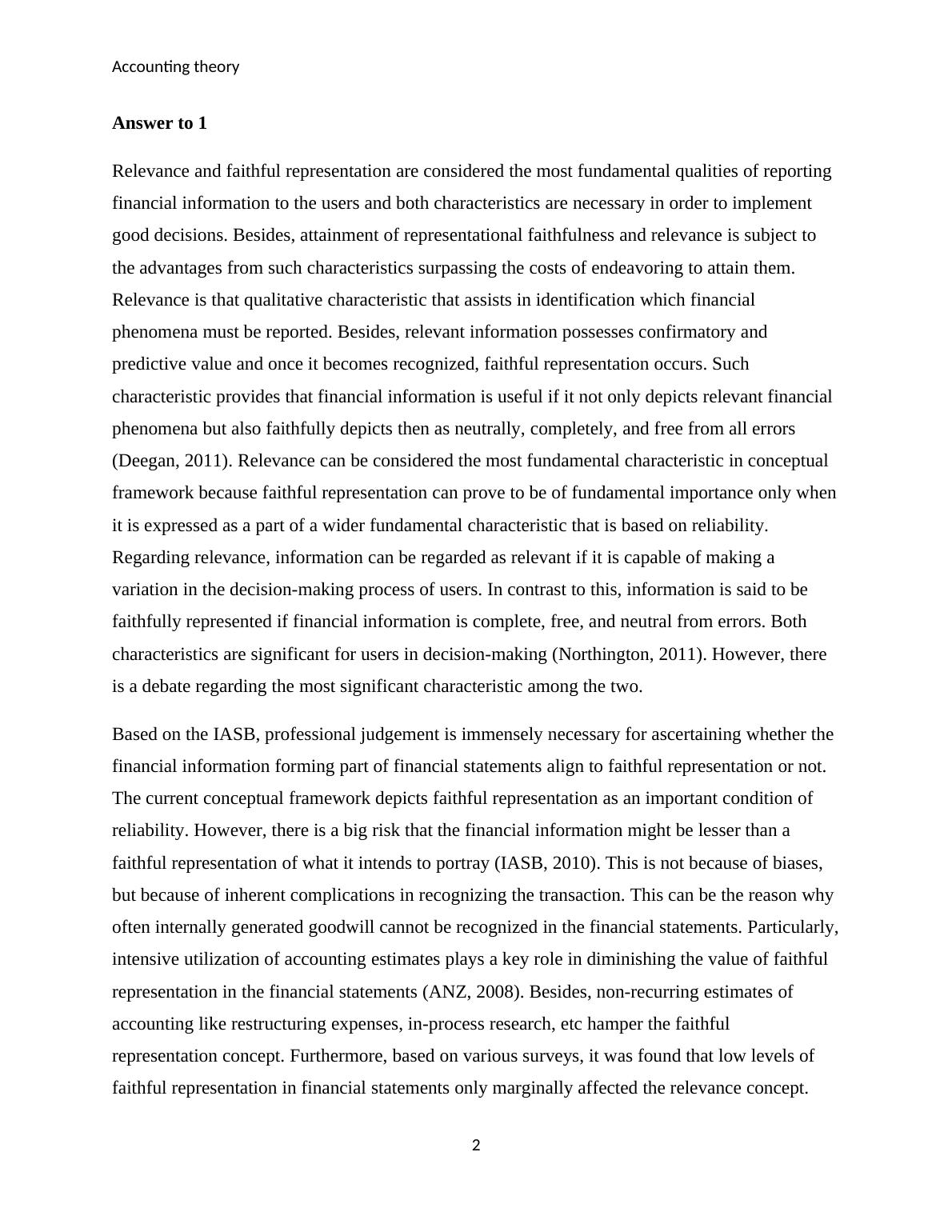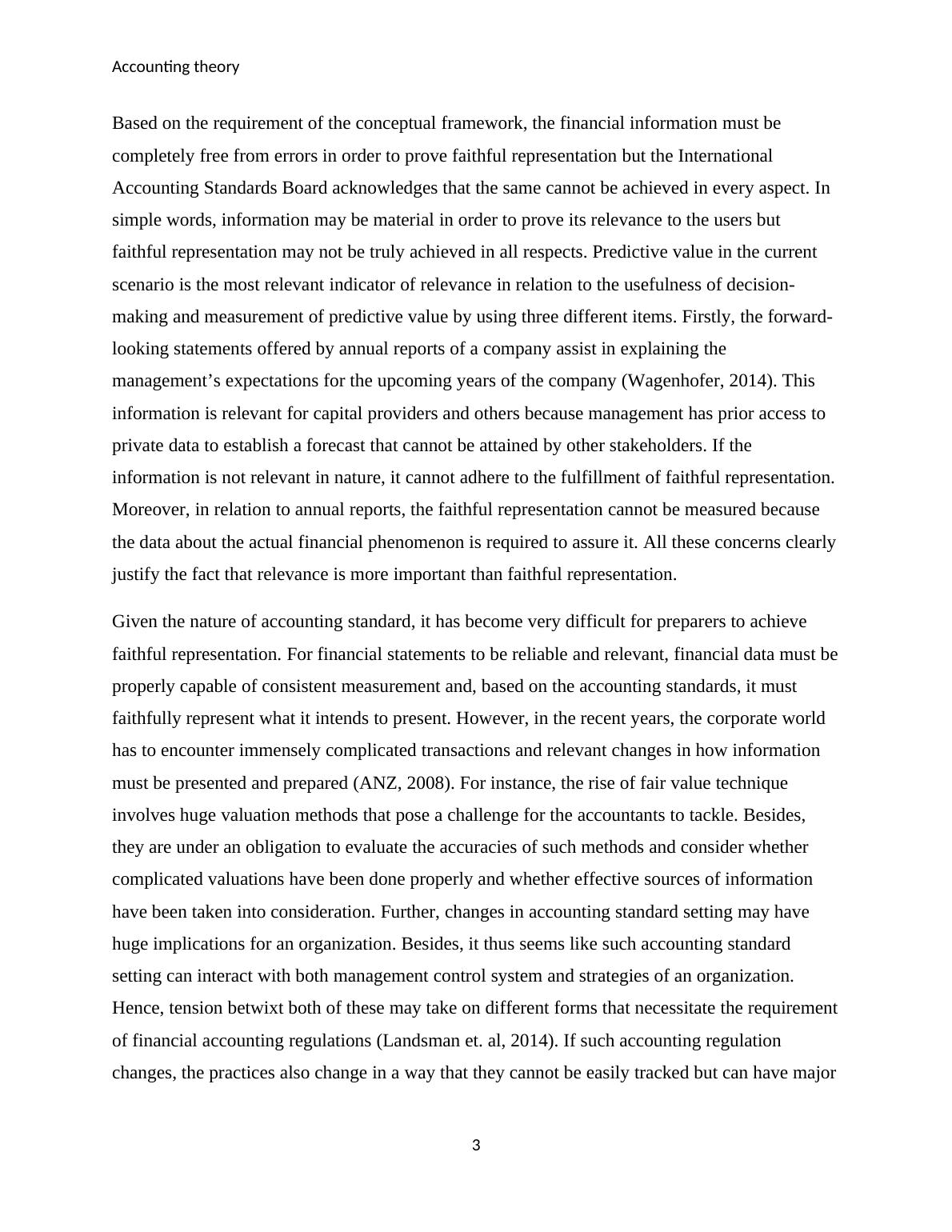Accounting Theory Document
Added on 2020-02-24
10 Pages2933 Words93 Views
ACCOUNTING THEORY

Accounting theoryAnswer to 1Relevance and faithful representation are considered the most fundamental qualities of reporting financial information to the users and both characteristics are necessary in order to implement good decisions. Besides, attainment of representational faithfulness and relevance is subject to the advantages from such characteristics surpassing the costs of endeavoring to attain them. Relevance is that qualitative characteristic that assists in identification which financial phenomena must be reported. Besides, relevant information possesses confirmatory and predictive value and once it becomes recognized, faithful representation occurs. Such characteristic provides that financial information is useful if it not only depicts relevant financial phenomena but also faithfully depicts then as neutrally, completely, and free from all errors (Deegan, 2011). Relevance can be considered the most fundamental characteristic in conceptual framework because faithful representation can prove to be of fundamental importance only whenit is expressed as a part of a wider fundamental characteristic that is based on reliability. Regarding relevance, information can be regarded as relevant if it is capable of making a variation in the decision-making process of users. In contrast to this, information is said to be faithfully represented if financial information is complete, free, and neutral from errors. Both characteristics are significant for users in decision-making (Northington, 2011). However, there is a debate regarding the most significant characteristic among the two. Based on the IASB, professional judgement is immensely necessary for ascertaining whether the financial information forming part of financial statements align to faithful representation or not. The current conceptual framework depicts faithful representation as an important condition of reliability. However, there is a big risk that the financial information might be lesser than a faithful representation of what it intends to portray (IASB, 2010). This is not because of biases, but because of inherent complications in recognizing the transaction. This can be the reason why often internally generated goodwill cannot be recognized in the financial statements. Particularly,intensive utilization of accounting estimates plays a key role in diminishing the value of faithful representation in the financial statements (ANZ, 2008). Besides, non-recurring estimates of accounting like restructuring expenses, in-process research, etc hamper the faithful representation concept. Furthermore, based on various surveys, it was found that low levels of faithful representation in financial statements only marginally affected the relevance concept. 2

Accounting theoryBased on the requirement of the conceptual framework, the financial information must be completely free from errors in order to prove faithful representation but the International Accounting Standards Board acknowledges that the same cannot be achieved in every aspect. In simple words, information may be material in order to prove its relevance to the users but faithful representation may not be truly achieved in all respects. Predictive value in the current scenario is the most relevant indicator of relevance in relation to the usefulness of decision-making and measurement of predictive value by using three different items. Firstly, the forward-looking statements offered by annual reports of a company assist in explaining the management’s expectations for the upcoming years of the company (Wagenhofer, 2014). This information is relevant for capital providers and others because management has prior access to private data to establish a forecast that cannot be attained by other stakeholders. If the information is not relevant in nature, it cannot adhere to the fulfillment of faithful representation.Moreover, in relation to annual reports, the faithful representation cannot be measured because the data about the actual financial phenomenon is required to assure it. All these concerns clearlyjustify the fact that relevance is more important than faithful representation.Given the nature of accounting standard, it has become very difficult for preparers to achieve faithful representation. For financial statements to be reliable and relevant, financial data must beproperly capable of consistent measurement and, based on the accounting standards, it must faithfully represent what it intends to present. However, in the recent years, the corporate world has to encounter immensely complicated transactions and relevant changes in how information must be presented and prepared (ANZ, 2008). For instance, the rise of fair value technique involves huge valuation methods that pose a challenge for the accountants to tackle. Besides, they are under an obligation to evaluate the accuracies of such methods and consider whether complicated valuations have been done properly and whether effective sources of information have been taken into consideration. Further, changes in accounting standard setting may have huge implications for an organization. Besides, it thus seems like such accounting standard setting can interact with both management control system and strategies of an organization. Hence, tension betwixt both of these may take on different forms that necessitate the requirementof financial accounting regulations (Landsman et. al, 2014). If such accounting regulation changes, the practices also change in a way that they cannot be easily tracked but can have major3

End of preview
Want to access all the pages? Upload your documents or become a member.
Related Documents
Accounting DEVELOPMENT IN ACCOUNTING Answer 1lg...
|8
|2721
|93
Defining fundamental characteristics of accountinglg...
|15
|3179
|132
Normative Theories in Accounting - Reportlg...
|12
|3313
|49
Conceptual Framework of Accountinglg...
|8
|2342
|325
Current Development In Accounting Assesmentlg...
|11
|3104
|19
Financial Reporting Assignment - IASBlg...
|7
|1610
|355